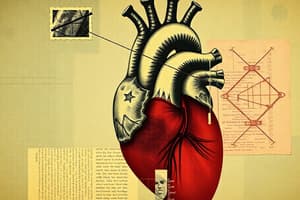Podcast
Questions and Answers
What are the serious symptoms of heart failure?
What are the serious symptoms of heart failure?
Dyspnea, fatigue, and fluid retention.
Which of the following are underlying causes of heart failure? (Select all that apply)
Which of the following are underlying causes of heart failure? (Select all that apply)
- Diabetes
- Myocardial infarction (correct)
- Hypertensive heart disease (correct)
- Congenital heart disease (correct)
- Arteriosclerotic heart disease (correct)
Heart failure can be classified only into one type.
Heart failure can be classified only into one type.
False (B)
What are the goals of pharmacologic intervention in heart failure? (Select all that apply)
What are the goals of pharmacologic intervention in heart failure? (Select all that apply)
The type of heart failure characterized by reduced mechanical pumping and reduced ejection fraction is known as ______.
The type of heart failure characterized by reduced mechanical pumping and reduced ejection fraction is known as ______.
What does activation of the renin-angiotensin system result in?
What does activation of the renin-angiotensin system result in?
What is the role of natriuretic peptides in heart failure?
What is the role of natriuretic peptides in heart failure?
Which class of drugs is NOT used in heart failure management?
Which class of drugs is NOT used in heart failure management?
Decompensated heart failure means the heart maintains adequate cardiac output.
Decompensated heart failure means the heart maintains adequate cardiac output.
Flashcards are hidden until you start studying
Study Notes
Heart Failure (HF)
- Heart failure (HF) is a condition in which the heart cannot pump blood efficiently to meet the needs of the body.
- Symptoms of HF include dyspnea (shortness of breath), fatigue, and fluid retention.
- Two main types of HF are systolic failure and diastolic failure, affecting approximately 50% and 50% of younger patients, respectively.
- Systolic failure is characterized by a weakened heart muscle, leading to reduced ejection fraction.
- Diastolic failure occurs when the heart stiffens and cannot relax properly, impairing filling and cardiac output.
- Causes of HF include:
- Arteriosclerotic heart disease
- Myocardial infarction
- Hypertensive heart disease
- Valvular heart disease
- Dilated cardiomyopathy
- Congenital heart disease
- Treatment goals for HF are focused on:
- Alleviating symptoms
- Slowing disease progression
- Improving survival
Drug Classes Used in HF
- Angiotensin-converting enzyme (ACE) inhibitors: Block the conversion of angiotensin I to angiotensin II, decreasing blood pressure and improving heart function.
- Angiotensin receptor blockers: Block the binding of angiotensin II to its receptors, reducing vasoconstriction and sodium retention.
- Aldosterone antagonists: Block the effects of aldosterone, reducing sodium and water retention and improving heart function.
- β-blockers: Reduce heart rate, decrease contractility, and improve heart function.
- Diuretics: Increase urine output, reducing fluid retention.
- Direct vaso- and venodilators: Directly relax blood vessels, lowering blood pressure and improving heart function.
- Hyperpolarization-activated cyclic nucleotide-gated channel blockers: Block the effects of cyclic nucleotides, reducing heart rate and improving heart function.
- Inotropic agents: Increase the force of heart muscle contractions, increasing cardiac output.
- Neprilysin inhibitor with an angiotensin receptor blocker combination: Blocks breakdown of natriuretic peptides and blocks angiotensin receptor, improving heart function and reducing mortality.
- Recombinant B-type natriuretic peptide: Offers similar benefits as the above combination, but may be used alone.
Compensatory Mechanisms in HF
- Four main compensatory mechanisms are activated in response to heart failure:
- Increased sympathetic activity: Stimulates the heart to beat faster and more forcefully, but also increases cardiac workload.
- Activation of the renin-angiotensin system: Increases blood pressure and fluid retention, further burdening the heart.
- Activation of natriuretic peptides: Promote vasodilation, natriuresis, and reduce renin and aldosterone release, primarily with atrial and B-type natriuretic peptides.
- Myocardial hypertrophy: The heart grows in size which enhances contraction initially, but contributes to further decline in heart function later.
Acute (Decompensated) HF
- If compensatory mechanisms fail to maintain cardiac output, HF is termed decompensated.
Therapeutic Strategies in HF for Chronic HF
- Reduction in physical activity: Decreases cardiac workload.
- Low dietary intake of sodium: Reduces fluid retention.
Studying That Suits You
Use AI to generate personalized quizzes and flashcards to suit your learning preferences.




